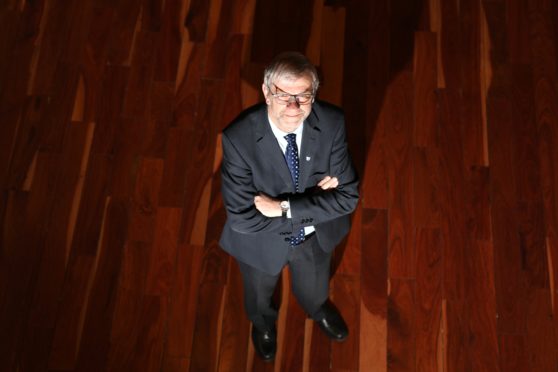The outgoing head of Dundee University has warned foreign students cannot be viewed as “cash cows” to support higher education in Scotland.
Professor Sir Pete Downes, 65, will officially retire as principal and vice-chancellor of the university next week.
Since his arrival in 1989, it has won global recognition in a number of fields and is regarded as offering one of the best student experiences in the UK.
However Prof Downes is warning universities face “overlapping” threats of Brexit and student financing in the coming years— and has urged the Scottish Government to look again at its funding formula.
Currently, Scottish and EU students do not pay tuition fees, although universities do receive money for each student’s tuition from the Scottish Funding Council.
Students from elsewhere in the UK pay around £9,000 a year in tuition fees, while there is no cap on the fees charged to students from elsewhere overseas.
Prof Downes said Dundee’s burgeoning global reputation had helped it to offset cuts in funding and would be crucial to sustaining the university in the future.
He said: “The major challenge for universities in my time as principal has been the effect of austerity on the public purse. The only real source of net income growth for universities in Scotland is overseas student recruitment.
“We do receive fees for Scottish students but the level of that fee is currently and has been for some time below the cost of the education we deliver for those students.
“The level of fee needs to be topped up by the larger fees we can command entirely because of our international reputation. But it’s too easy to look at overseas students as a source of cash. They actually are a source of diversity and enhance and enrich the experience of everybody.”
He said the perception that overseas students are paying for Scottish places risked creating a schism in the university community.
He said: “We have to work really hard to make people feel welcome. That’s why the Scottish Government needs to look hard at the funding of its own students and not simply allow overseas students to become cash cows.
“The Scottish Government does have a strong and positive culture with respect to the value we place on Europe, the value we place on international relationships and connections and undoubtedly values international students for what they bring to our own culture, but they don’t look at it through the prism that I do.”
Prof Downes, who was appointed principal in 2009, added: “People say the university feels like a real community.
“Our strategy for the next five years is that communities can function even in difficult circumstances proving they share common goals.
“The other thing about that is successful communities, and this brings the Brexit issue in as well, are diverse communities, not homogeneous.
“That seems to me to have escaped the attention of those who seem to think immigration and things like that are fundamentally a bad thing and need to be restricted.
“Universities undoubtedly thrive on being able to recruit talent from a global talent pool. We have staff from more than 50 different counties and in excess of 10% of our staff are from the EU.
“It’s really important that we retain that access.”
Prof Downes will be succeeded as principal and vice-chancellor by Professor Andrew Atherton on January 1.
A Scottish Government spokesperson said: “We agree with Professor Downes about the importance of overseas students in Scotland’s universities. They help make our institutions the diverse and vibrant places that is such a massive strength of Scottish Higher Education.
“That’s why we are extremely proud that Scotland is a destination of choice for so many overseas students who make such a huge contribution to Scottish life.
“We are committed to ensuring this remains the case as we explore every avenue to protect our relationship with the EU.
“The biggest issue facing overseas students in Scotland is the uncertainty caused by the UK Government’s failure to provide immediate assurances that the immigration status and rights of EU nationals currently living in Scotland will not change in the future.”









